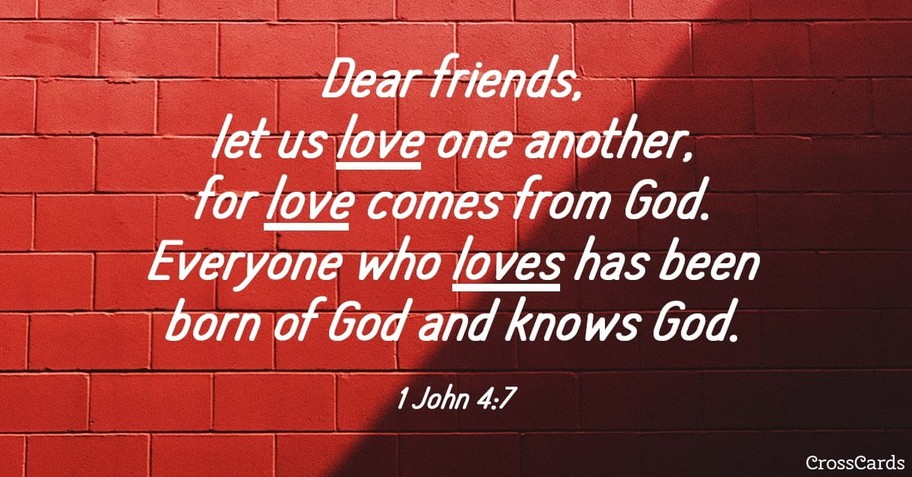What is Agape Love? (And What Does it Mean for Me?)

Agape, in the New Testament, is the fatherly love of God for humans, as well as the human reciprocal love for God. In the Bible, the transcendent agape love is the highest form of love and is contrasted with eros, erotic love, and philia, or brotherly love.
Agape love is love at the highest level. It's so much more than we could ever dream or imagine. It is selfless, sacrificial love, which is spoken of over 200 times in the Bible. Here is everything you need to know about God's perfect, unconditional agape love for us.
Our world has many definitions of love, but we most commonly think about love in a romantic sense. What if love, true love, meant more than romance? What if there was a deeper, truer, more full expression of love that could only be found in God and received through Jesus Christ? Here is everything you need to know about God's perfect, unconditional agape love for us.
Quick Facts:
- agape is a Greek word pronounced ah-gah-pay
- agape love is a love of choice, not out of attraction or obligation
- agape love is what Jesus Christ displayed on the cross for us as He took our place for the sin
I’ve studied the Greek terms for love, especially the word agapē, which is supposed to be the highest expression of love - a pure, selfless, unconditional thing. Agape love is love at the highest level. It's so much more than we could ever dream or imagine. When we fully understand and grasp what agape love means for us, it will transform how we view ourselves and, ultimately, how we view ourselves.
Here is everything you need to know about God's perfect, unconditional agape love for us:

The Biblical Meaning and Definition of Agape Love
The New Testament Greek Lexicon defines "agape" like this:
1. brotherly love, affection, good will, love, benevolence
2. love feasts
The name Agape or "love-feast," as an expression denoting the brotherly common meals of the early church where Christians gathered to break bread. The agape meal would serve as a fellowship to the sense of brotherhood, and the community of goods practiced by the young Christian church.
The word "agape" is used 106 times throughout the New Testament with the highest usage in the boo of 1 John. To read those verses, follow the links here.
Agape love is a sacrificial love that binds. It is the love of God that we see through the cross of Jesus Christ. It is the love that saves and restores humanity in the face of sin and death.
Photo credit: GettyImages/Davizro

God Is Love
“God is love. Whoever lives in love lives in God, and God in them.” (1 John 4:16)
I’m beginning to think that love is not what it means. Okay, now that I’ve written that out loud I realize it doesn’t make sense out of context, so let me go back a little bit.
I’ve been having trouble sleeping lately (big surprise). When that happens, I usually pass the night trying to pray through questions I have about faith and life, and lately I’ve been praying about love. You see, I have known great love, intimately, purposely, lavished on me with unwavering determination for 30 years, three months, and three days. Then, too soon, came the day when cancer took my wife’s body, set her spirit free, and left me behind sleepless and alone. Now, more than a year after hearing the hum of Amy’s last breath, I keep wondering why the pain of losing this love (at least here on this earth) has kept such a stranglehold on me for so long after she has died.
I’ve thought about it a lot, and read about love and the meanings of love. I’ve also studied the Greek terms for love, especially the Greek word agapē which is supposed to be the highest expression of love—a pure, selfless, unconditional thing. But as I meditate on the love I’ve experienced, examining how it shaped and reshaped me, even agapē seems not enough to explain it.
We need to find ourselves rooted in the truth that “God is love”—something the Apostle John taught us both (1 John 4:16). If that’s really true, then love encompasses more than just the highest expression of selflessness. Inherent in Christ’s personhood is every shade and texture and breath and aspect and heartbeat and death knell and meaning of whatever love is.
This is probably why 1 Corinthians 13 describes love (and by extension God) with a laundry list of concepts: “Love is patient, love is kind. It does not envy, it does not boast, it is not proud. It does not dishonor others, it is not self-seeking, it is not easily angered, it keeps no record of wrongs. Love does not delight in evil but rejoices with the truth. It always protects, always trusts, always hopes, always perseveres…” This is also why, within each of us, the presence of God (who is love) naturally expresses itself in “love, joy, peace, patience, kindness, goodness, faithfulness, gentleness, self-control” (Galatians 5:22-23).
So if God is love, and God is all these things, then love is all these things, which makes it more than simply agapē. His love is not just the highest form of love, it is ALL of love—love that laughs, that rests, that waits and forgives and so much more.
Content adapted from "Love is Not What You Think It Is" by Mike Nappa.
Photo credit: Unsplash-hao wang. Design credit: Rachel Dawson

A New Meaning of Love
Even love defined as all of love is not adequate to explain the kind of love I’ve experienced, both from Amy and from our Christ. And here’s why:
Language at its core is a collection of symbols that society agrees will represent reality. Our words for love are, at best then, tokens of meaning, not exact expressions of substance. We cram letters together and say “this is what those letters mean” but symbols alone can never fully communicate the truth of what they represent.
For instance, you and I both know that the letters “A-m-y” may mean someones wife, friend, or co-worker. But the experience of, the physicality and spiritual self of—the truth and soul of—“Amy!” is not adequately represented by those letters. In fact, my truth of Amy is radically different from your truth of Amy or heaven’s truth of Amy, yet all our truths are still Amy. In this way, Amy is much, much more than what “A-m-y” could ever mean in any language.
It’s like this also when we begin to speak of love, or heaven’s “agapē.” L-o-v-e is not just what we’ve all agreed that those letters should define. It is unfathomably, immeasurably, inexpressibly more. We know it instinctively, deep within the soul, but we can never adequately define or even understand it.
And so tonight, while I can’t sleep, I look at 1 John 4:16 (“God is love”) and no longer see just a definition of God or love or agapē to catalog and quote with casual indifference. Those three words, those simple alphabetical symbols have now become for me a moment of awe… a reason to worship… an unbreakable promise that the best is yet to come.
Because… I’m beginning to think that love is not simply what it means.
Design credit: Rachel Dawson
Content adapted from "Love is Not What You Think It Is" by Mike Nappa.

Bible Verses About Agape Love
God is love! If we want the perfect example of love, it is in our creator God. Often, God's love is referred to as agape love which is the highest form of love that is selfless and sacrificial. It is steadfast, unchanging, and unconditional. Below are a few Scripture examples of God's great love for you!
- "Dear friends, let us love one another, for love comes from God. Everyone who loves has been born of God and knows God. Whoever does not love does not know God, because God is love." ~ 1 John 4:7-8
- "This is how God showed his love among us: He sent his one and only Son into the world that we might live through him. This is love: not that we loved God, but that he loved us and sent his Son as an atoning sacrifice for our sins. Dear friends, since God so loved us, we also ought to love one another. No one has ever seen God; but if we love one another, God lives in us and his love is made complete in us." ~ John 4:9-12
- "And so we know and rely on the love God has for us. God is love. Whoever lives in love lives in God, and God in them. This is how love is made complete among us so that we will have confidence on the day of judgment: In this world we are like Jesus. There is no fear in love. But perfect love drives out fear, because fear has to do with punishment. The one who fears is not made perfect in love." ~ 1 John 4:16-18
- "We love because he first loved us." ~ 1 John 4:19
- “As the Father has loved me, so have I loved you. Now remain in my love. If you keep my commands, you will remain in my love, just as I have kept my Father’s commands and remain in his love." ~ John 15:9-10
- "My command is this: Love each other as I have loved you. Greater love has no one than this: to lay down one’s life for one’s friends." ~ John 15:12-13
- "For God so loved the world that he gave his one and only Son, that whoever believes in him shall not perish but have eternal life." ~ John 3:16
- "Now therefore that the LORD your God is God, the faithful God who keeps covenant and steadfast love with those who love him and keep his commandments, to a thousand generations." ~ Deuteronomy 7:9
- "But you, O Lord, are a God merciful and gracious, slow to anger and abounding in steadfast love and faithfulness." ~ Psalms 86:15
- "God shows his love for us in that while we were still sinners, Christ died for us." ~ Romans 5:8
- "God, being rich in mercy, because of the great love with which he loved us, even when we were dead in our trespasses, made us alive together with Christ - by grace you have been saved." ~ Ephesians 2:4-5
Design credit: Unsplash

A Prayer for Agape Love
God’s love for you and me is passionate, pure and beyond anything we’ve ever experienced, accepting us as we are. Our good, our sins, our past and our flaws are all bare before His eyes, yet being the perfect Father He is, He washes, changes, teaches and grows us tenderly. He reminds us of our worth as his sons and daughters. He wants to forgive, bless and take care of us. He loves us with unconditional agape love.
Heavenly Father, You have shown me what true love is. Before I knew you, you loved me and poured your love out for me on the cross. Lord, I pray that I would reflect your agape love to this world. Lead me by the Holy Spirit to love selflessly and sacrificially...and may it lead others to salvation.
"Though our feelings come and go, God’s love for us does not." C.S. Lewis
"The nature of God’s love is unchangeable. Ours alternates all to readily. If it is our habit to love God with our own affection we shall turn cold towards Him whenever we are unhappy." Watchman Nee
"Believe God’s love and power more than you believe your own feelings and experiences. Your rock is Christ, and it is not the rock that ebbs and flows but the sea." Samuel Rutherford
"Measure not God’s love and favour by your own feeling. The sun shines as clearly in the darkest day as it does in the brightest. The difference is not in the sun, but in some clouds which hinder the manifestation of the light thereof." Richard Sibbes
"God’s unfailing love for us is an objective fact affirmed over and over in the Scriptures. It is true whether we believe it or not. Our doubts do not destroy God’s love, nor does our faith create it. It originates in the very nature of God, who is love, and it flows to us through our union with His beloved Son." Jerry Bridges
For more study on the four types of love in Scripture:
- Eros is used to express physical attraction and a sexual love
- Phila love is a brotherly loved used to describe friendship
- Storge love is used for family love such as between parent and child
Photo credit: ©GettyImages/AaronAmat
This article is part of our larger resource library of terms important to the Christian faith. From heaven and hell, to communion and baptism, we want to provide easy to read and understand articles that answer your questions about theological terms and their meaning.
The Fruit of the Spirit - What Are They?
What is the Tithe?
What is the Sabbath and is it Still Important?
The Trinity - Father, Son, Holy Spirit Explained
Armor of God - What is it and How to Use it
Originally published March 01, 2021.








